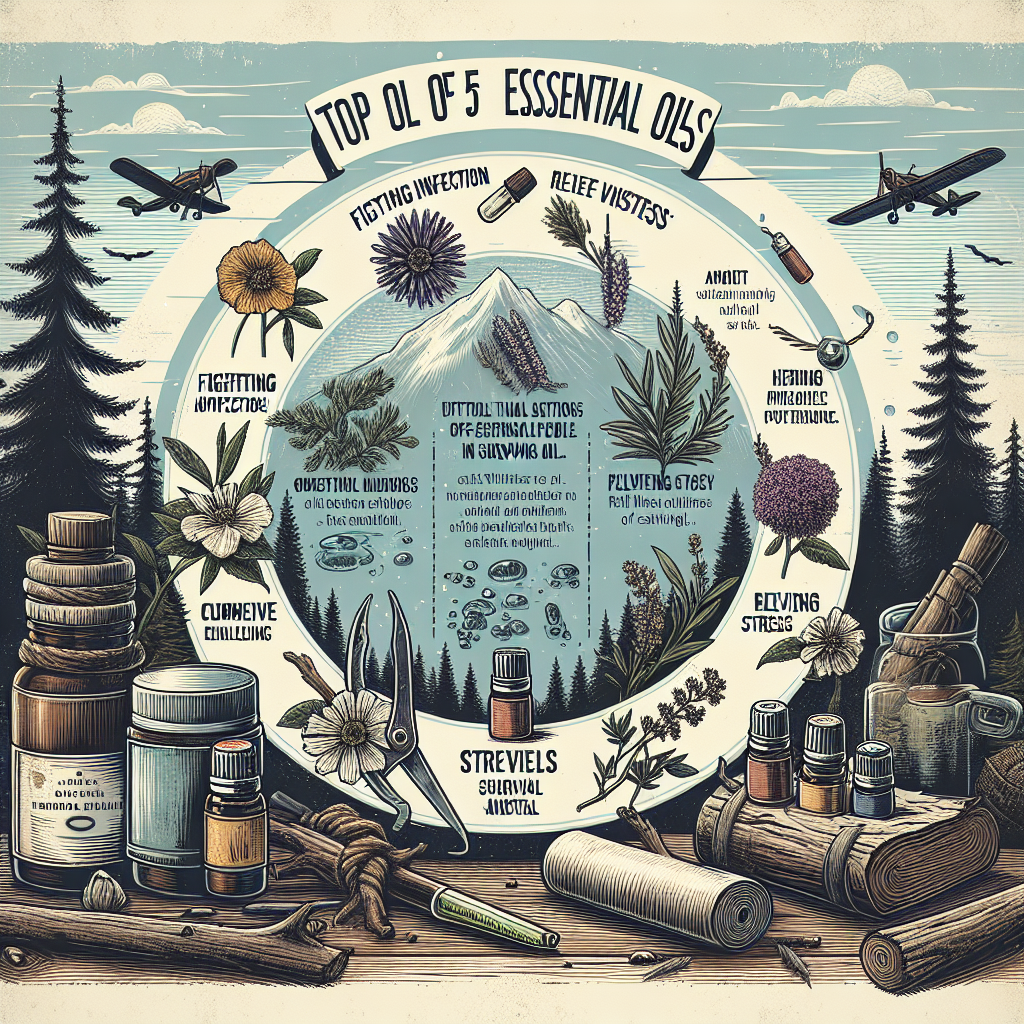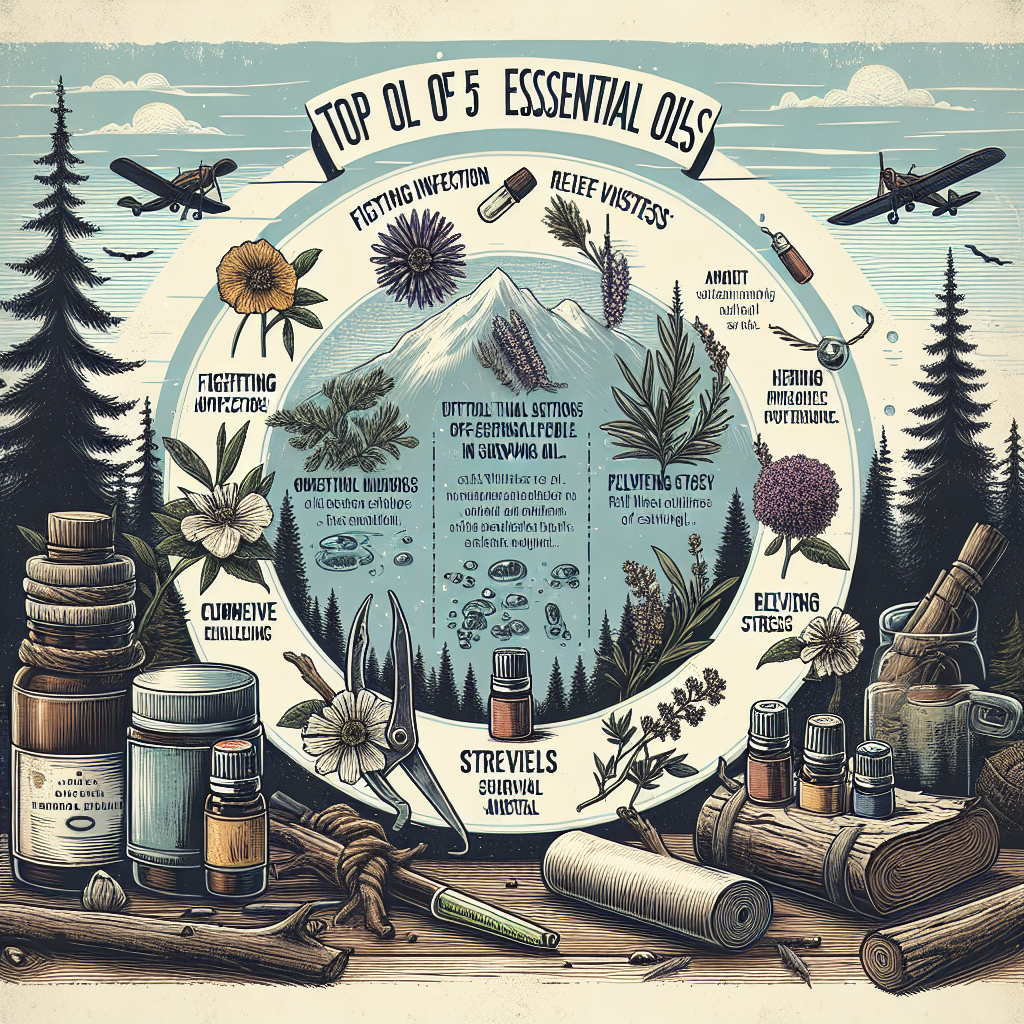If you find yourself exploring the world of survival or simply looking for natural remedies for everyday ailments, essential oils are a must-have in your arsenal. These powerful and concentrated liquids extracted from plants have a myriad of uses that can help you navigate through various survival situations. From soothing wounds and relieving pain to boosting immunity and repelling insects, essential oils offer a natural and effective solution. In this article, we will explore the top 5 essential oils that should be on every survivalist’s list, along with their incredible benefits and how to use them. So, grab a cup of tea and get ready to discover the wonders of nature’s own survival kit!
1. Tea Tree Oil
Tea Tree Oil is a versatile and powerful essential oil that has numerous benefits for your survival needs.
Benefits of Tea Tree Oil
Tea Tree Oil is known for its natural antiseptic properties, making it a valuable addition to your survival kit. It can be used to clean wounds, cuts, and scrapes, helping to prevent infection and promote faster healing. Additionally, Tea Tree Oil has anti-inflammatory properties, which can help reduce swelling and ease pain associated with minor injuries.
Another benefit of Tea Tree Oil is its effectiveness in treating fungal infections such as athlete’s foot, ringworm, and nail fungus. Its antifungal properties can help eliminate the infection and prevent it from spreading. In addition to its antiseptic and antifungal properties, Tea Tree Oil also has antibacterial properties, making it an excellent natural alternative to chemical-based cleaning products.
How to Use Tea Tree Oil for Survival
To use Tea Tree Oil for wound care, simply dilute a few drops of Tea Tree Oil with a carrier oil such as coconut oil or olive oil. Apply the mixture to the affected area using a clean cotton ball or swab. For treating fungal infections, apply a drop or two of Tea Tree Oil directly to the affected area, making sure to cover the entire surface. Repeat the process twice a day until the infection clears up.
Tea Tree Oil can also be used as a natural insect repellent. Mix a few drops of Tea Tree Oil with water and spray it on your skin or clothing to repel mosquitoes, ticks, and other pests. Additionally, Tea Tree Oil can be used to alleviate itchiness and irritation from insect bites.
Safety Precautions
While Tea Tree Oil is generally safe to use, it’s essential to dilute it properly before applying it to the skin, as it can be irritating in its concentrated form. It is also recommended to perform a patch test on a small area of skin before using Tea Tree Oil for the first time, especially if you have sensitive skin. If you experience any adverse reactions such as redness, itching, or swelling, discontinue use immediately. As with any essential oil, keep Tea Tree Oil out of reach of children and pets.
2. Lavender Oil
Lavender Oil is a calming and soothing essential oil that can be a valuable addition to your survival kit.
Benefits of Lavender Oil
Lavender Oil is widely known for its relaxing and stress-relieving properties. In a survival situation, it can help alleviate anxiety, promote better sleep, and provide a sense of calm and comfort. Lavender Oil can also be useful for treating minor burns and sunburns due to its anti-inflammatory properties.
Another benefit of Lavender Oil is its ability to repel insects, especially mosquitoes. By applying a few drops of Lavender Oil to your skin or clothing, you can help keep pesky bugs at bay, reducing the risk of insect bites and the potential transmission of diseases.
How to Use Lavender Oil for Survival
To promote relaxation and better sleep, add a few drops of Lavender Oil to a diffuser or mix it with a carrier oil to create a massage oil. You can also put a few drops of Lavender Oil on your pillow or bedding before going to sleep. If you experience a minor burn or sunburn, apply a drop or two of Lavender Oil directly to the affected area to soothe the skin and reduce inflammation.
To repel insects, dilute Lavender Oil with water and spray it on your skin or clothing as needed. Alternatively, you can apply a drop or two of undiluted Lavender Oil to pulse points or behind your ears to deter bugs.
Safety Precautions
Lavender Oil is generally safe for most people, but some individuals may experience sensitivity or allergic reactions. It is advisable to perform a patch test before using Lavender Oil topically, especially if you have sensitive skin. If irritation occurs, discontinue use immediately. Keep Lavender Oil out of reach of children and pets, and avoid ingestion of the oil.

3. Eucalyptus Oil
Eucalyptus Oil is a powerful essential oil with a wide range of uses for survival situations.
Benefits of Eucalyptus Oil
Eucalyptus Oil is well-known for its respiratory benefits. It can help relieve congestion, coughs, and sinusitis by clearing the airways and promoting easier breathing. In a survival scenario where medical assistance may be limited, Eucalyptus Oil can provide much-needed relief from respiratory discomfort.
Additionally, Eucalyptus Oil has antibacterial and antiviral properties, making it an excellent natural disinfectant. It can be used to clean wounds, cuts, and scrapes, helping to prevent infection and promote healing. Eucalyptus Oil also has analgesic properties, which can help alleviate muscle and joint pain associated with physical exertion or injury.
How to Use Eucalyptus Oil for Survival
To clear congestion and promote easier breathing, add a few drops of Eucalyptus Oil to a bowl of hot water, cover your head with a towel, and inhale the steam. This can help open up the airways and provide relief from sinus congestion. Another option is to create a steam bath by adding a few drops of Eucalyptus Oil to a hot shower and inhaling the steam.
For wound care, dilute a few drops of Eucalyptus Oil with a carrier oil and apply it to the affected area using a clean cotton ball or swab. This can help disinfect the wound and promote faster healing. To alleviate muscle and joint pain, mix a few drops of Eucalyptus Oil with a carrier oil and massage it into the affected area.
Safety Precautions
While Eucalyptus Oil is generally safe to use, it should not be ingested as it can be toxic. It is also important to dilute Eucalyptus Oil before applying it to the skin, as it can cause irritation or allergic reactions in some individuals. If irritation occurs, discontinue use immediately. Keep Eucalyptus Oil out of reach of children and pets.
4. Peppermint Oil
Peppermint Oil is a refreshing and invigorating essential oil that offers various benefits for survival situations.
Benefits of Peppermint Oil
Peppermint Oil is known for its cooling and soothing properties, making it an excellent natural remedy for headaches, migraines, and muscle tension. It can help alleviate pain and provide relief from discomfort, allowing you to stay focused and alert in challenging situations.
In addition to its analgesic properties, Peppermint Oil is also an effective natural insect repellent. Its strong scent can deter mosquitoes, ants, spiders, and other pests, minimizing the risk of bites or infestations.
How to Use Peppermint Oil for Survival
To relieve headaches or muscle tension, dilute a few drops of Peppermint Oil with a carrier oil and apply it to your temples, forehead, or the affected area. Gently massage the oil into your skin and inhale the aroma for added relaxation. You can also add a few drops of Peppermint Oil to a cool compress and apply it to your forehead or neck.
To repel insects, dilute Peppermint Oil with water and spray it on your skin or clothing. Alternatively, you can soak cotton balls in Peppermint Oil and place them in areas where pests are commonly found, such as doorways, windows, or outdoor seating areas.
Safety Precautions
Peppermint Oil is generally safe for most people, but it can cause skin irritation in some individuals, especially if used undiluted. Perform a patch test before using Peppermint Oil topically, and discontinue use if irritation occurs. Avoid applying Peppermint Oil near the eyes or mouth, as it can cause a cooling sensation that may be uncomfortable. Keep Peppermint Oil out of reach of children and pets.

5. Clove Oil
Clove Oil is a versatile and potent essential oil that can be a valuable addition to your survival kit.
Benefits of Clove Oil
Clove Oil is well-known for its analgesic properties, making it an effective natural remedy for toothaches, gum pain, and oral infections. Its numbing effect can provide temporary relief from dental discomfort during emergency situations when access to dental care may be limited.
In addition to its dental benefits, Clove Oil has antimicrobial properties, which can help prevent the growth of bacteria and fungi. It can be used to clean wounds, cuts, and scrapes, reducing the risk of infection and promoting faster healing.
How to Use Clove Oil for Survival
To alleviate toothaches or gum pain, apply a small amount of Clove Oil directly to the affected area using a clean cotton ball or swab. The oil will temporarily numb the area, providing relief from pain. It is essential to note that Clove Oil should not be applied directly to the gums or teeth for an extended period, as prolonged contact may cause irritation.
To clean wounds and prevent infection, dilute a few drops of Clove Oil with a carrier oil and apply it to the affected area using a clean cotton ball or swab. This can help disinfect the wound and promote healing.
Safety Precautions
Clove Oil is generally safe when used topically, but it should be used in moderation and not ingested. Undiluted Clove Oil can cause skin irritation and sensitivity, so it is important to dilute it properly before applying it to the skin. If irritation occurs, discontinue use immediately. Keep Clove Oil out of reach of children and pets.

